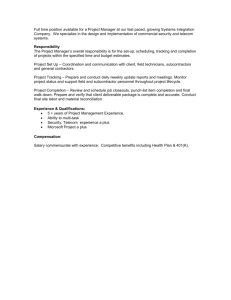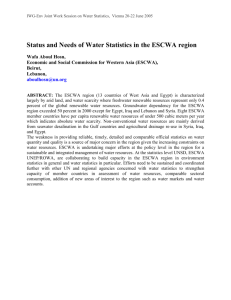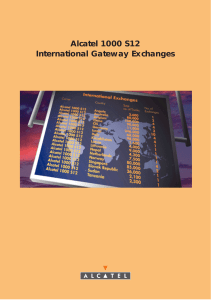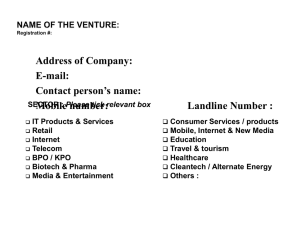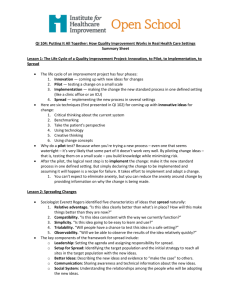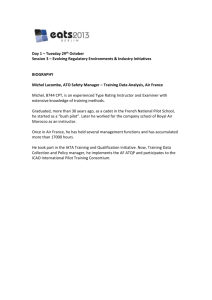Template for Short-From Project Proposals
advertisement
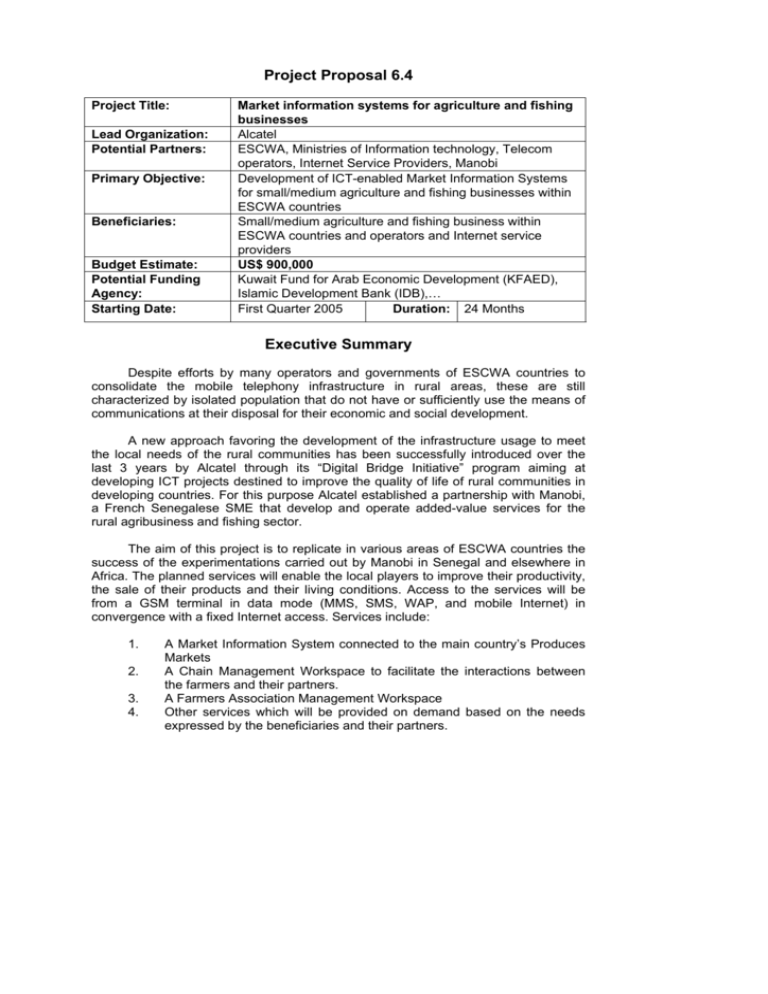
Project Proposal 6.4 Project Title: Lead Organization: Potential Partners: Primary Objective: Beneficiaries: Budget Estimate: Potential Funding Agency: Starting Date: Market information systems for agriculture and fishing businesses Alcatel ESCWA, Ministries of Information technology, Telecom operators, Internet Service Providers, Manobi Development of ICT-enabled Market Information Systems for small/medium agriculture and fishing businesses within ESCWA countries Small/medium agriculture and fishing business within ESCWA countries and operators and Internet service providers US$ 900,000 Kuwait Fund for Arab Economic Development (KFAED), Islamic Development Bank (IDB),… First Quarter 2005 Duration: 24 Months Executive Summary Despite efforts by many operators and governments of ESCWA countries to consolidate the mobile telephony infrastructure in rural areas, these are still characterized by isolated population that do not have or sufficiently use the means of communications at their disposal for their economic and social development. A new approach favoring the development of the infrastructure usage to meet the local needs of the rural communities has been successfully introduced over the last 3 years by Alcatel through its “Digital Bridge Initiative” program aiming at developing ICT projects destined to improve the quality of life of rural communities in developing countries. For this purpose Alcatel established a partnership with Manobi, a French Senegalese SME that develop and operate added-value services for the rural agribusiness and fishing sector. The aim of this project is to replicate in various areas of ESCWA countries the success of the experimentations carried out by Manobi in Senegal and elsewhere in Africa. The planned services will enable the local players to improve their productivity, the sale of their products and their living conditions. Access to the services will be from a GSM terminal in data mode (MMS, SMS, WAP, and mobile Internet) in convergence with a fixed Internet access. Services include: 1. 2. 3. 4. A Market Information System connected to the main country’s Produces Markets A Chain Management Workspace to facilitate the interactions between the farmers and their partners. A Farmers Association Management Workspace Other services which will be provided on demand based on the needs expressed by the beneficiaries and their partners. A key issue for success is the right choice of areas and local partners for the pilot phase experimentations. The objective of these pilot phases is the build-up of valid business models for larger scale deployments. It is expected to realize three pilot experimentations within 3 different ESCWA countries during this project. The total expected budget is US$ 900,000. 1. Objectives The main objective of this project is to present the case that deploying telecom infrastructure in rural areas is not only essential for their development but also lucrative for the operators. The cornerstone of the case is a service offer that concretely contribute to the improvement of the daily life of a representative category of professionals living in such areas (farmers, fishermen), The objective therefore is to seek win-win situations whereby farmers or fishermen using their GSM phone extensively for the purpose of improving their business (and hence their margins) will consequently consume more traffic and services from the telecom operator hence improving the latter’s revenues. More important, and despite the fact that such professionals probably may not constitute the majority of the population living within a generally poor rural area, their presence and high use of the telecom infrastructure services will have a “snowball effect” attracting other less fortunate population categories to the telecom services: this shows that the use of telecom services to concretely improve a business revenues will have a significant example value to the surrounding population and facilitate the adoption of new technologies. Ultimately the telecom operator will find it viable to deploy its infrastructure even within poor areas where the “general wisdom” is to refrain from such deployments due to the low expected revenues. Finally, such innovative services will likely improve the population awareness that services offered through ICT can make life easier despite – or even because of – the lack of other basic infrastructure like roads, electricity or water. This awareness will likely nurture other service ideas (that can be incubated through the companion partnership space project) adding new usage patterns and justification for the telecom infrastructure deployment. 2. Background and Justification This project is justified out of the belief that bridging the digital divide will only happen at a significant scale as a result of the converged interests of public and private actors. ESCWA countries unfortunate to have both a very decent level of telecom infrastructure deployment (in some cases comparable to developed countries) and the presence of a dynamic and financially strong actors owning those infrastructures and seeking growth opportunities within the region. 2 Such growth opportunities exist within the region because disparities in terms of telecom infrastructure deployment do exist whether inside a given country or between the region’s countries; the region has therefore ample opportunities for growth in order to serve its currently under-served areas. In another respect if we use the yardstick of infrastructure usage and level of revenues, disparities between rich urban areas and poorer rural areas are often manifest; driving the latter’s Average Revenue Per User (ARPU) is a challenge that many of the region’s operators must face in order to improve their business and the growth of their networks. Last but not least, many of the region’s countries still rely heavily on an agricultural sector whose average productivity does not yet ensure a sufficiently decent level of living for the population working directly from this activity. Therefore any service that might improve the latter’s population revenue will have an impact on the region’s economy much beyond the sphere of ICT. Said otherwise, the value of ICT as a lever for development will be proven upon a successful completion of this project. This project is justified by previous successes carried out by Alcatel and its partner Manobi in Senegal. Manobi started its operation in late 2001 but opened its commercial service to farmers in Senegal in June 2003 after a development and trial phase; by the end of that same year it had about 400 paid subscribers. Subscribers to Manobi service are small/medium producers of fruits and vegetables ; they are characterized by a relatively high ARPU (Average Revenue Per User) of 40 US$/month. A Manobi user has an average air time per day of 5 minutes with 90% of it spent on Manobi data service looking for fruits and vegetables prices in Dakar’s major market-places. Many users claimed that the service improved their margins by up to 30% largely paying back the cost of their subscription to Manobi’s information service (5000F CFA – 7.62 €/month). Manobi developed a version for its service for fishermen within the Kayar fishing zone near Dakar. This project was carried out with the support of a grant from InfoDev. One key added feature of the fishermen version of Manobi service is related to security where, thanks to long-haul GSM radio antennas directed toward the sea (up to 110 Km), fishermen can send warnings with their mobile phones in case of problem and can be localized with a mixture with a combined GSM-GPS system. The first long-haul antenna was recently installed by Alcatel for the national mobile operator Sonatel. The commercial opening of this service is pending an agreement with professional fishing organizations to promote Manobi service and agreement with banks to offer loans to fishermen to buy a mobile handset and a SIM card. It must be noted that the incentive for adopting the Manobi system by fishermen will be much greater when Sonatel will finalize its coverage of the Senegal shores by long-haul GSM radio antennas. It must finally be noted that Manobi received the WSIS best e-content award in the e-inclusion category during the Geneva Summit of December 2003. 3 3. Project Description The project is centered upon the realization of pilot experimentations within selected rural areas of ESCWA countries. For each such area, farmers or fishermen must be able to use their mobile phones, or alternatively a fixed access to the Internet, to retrieve daily updated data related to the price of their produces within major market places of neighboring cities where they usually sell their produces. In order for a pilot experimentation to be meaningful and bring added value for further large scale deployments, the following set of minimal conditions must be met : - The involvement of a telecom operator willing to expand and improve the mobile radio coverage of the concerned zone if needed. The availability of third party service providers having the capability of developing (or acquiring the technology needed to develop) added-value services for agriculture and fishing business in rural areas. The articulation of the experimentation with existing commercial exchange patterns between the concerned populations and the market places that will be covered. An adequate training of the end-users regarding the use of the provided service and a close observation of their usage patterns by a trained personnel. The existence of a favorable local regulatory framework whereby telecom operators must allow third party service providers to interconnect with their network at a cost-based fees. The project will start with a first phase where the concept of added value services for farmers and fishermen will be presented to telecom operators but also to ministries of agriculture and farming and fishing organizations of ESCWA countries. The purpose of this phase is to establish a cartography of potential areas where such services will be meaningful in terms of impact and realistic with respect to the possibility of meeting the above-mentioned criteria. A second phase will be devoted to the finalization of the list of project areas where experimentations of added value services will be carried out. For each area, a project agreement involving the service provider, a telecom operator, professional fishing or farming organizations with, if needed, the backing of the ministries in charge of agriculture and ICT will be established. Alcatel and its partner Manobi will act as providers of technical expertise for the elaboration of such agreements. Manobi may act in certain circumstances as a service provider or license its technology and know-how to a local service provider. The third phase deals with the actual realization of the pilot experimentations within the areas selected. It is It is expected that the technical installation for the effective launch of the service will take a relatively short time of a maximum of 3 months. However, the effective experimentation period must last at least 6 months and include significant periods where farmers effectively use the provided service to sell their produces (especially in case of seasonal crops) in order to be meaningful. It must be noted that the pilot experimentations will capitalize on previous experience acquired by Alcatel and Manobi in Senegal and elsewhere in Africa. The service 4 deployment phase will be rapid and cover much larger zones than the initial African experimentation. The real focus of the experimentation will be on collecting enough relevant data to substantiate the proof that the service is really contributing to the enduser’s revenue improvement and, by way of consequence, improving their ARPU ; this will in turn bring further the case for the telecom operators to improve their coverage of under-served rural areas and bring larger scale deployments. The fourth phase will deal with an assessment of the experimentations carried out and the definition of concrete perspectives for the development of the telecom infrastructure for the concerned countries and areas of experimentation. 4. Expected Accomplishments and Indicators of Achievement Expected Accomplishments Improvement of the standard of living of the professionals subscribing to the MIS within the experimentation zones and their use of the mobile infrastructure Contribution to the improvement of the business case of mobile operators within the concerned experimentation zones Dissemination of information to regional stakeholders Indicators of Achievement - An average improvement of 15-30% of margins must be observed - An average improvement of air-time and ARPU of 25-50% must be observed - Possibility to establish that operator revenues could be improved on average by a margin of 20% with the MIS service - Generalize awareness to all ESCWA regional operator regarding the above impacts of MIS - Launch of at least 2 larger-scale deployment of mobile service within underserved rural zones following the pilot experimentation. 5. Activities 1. Creation of regional awareness for Market Information Systems for farming and fishing sectors This activity will materialize with the realization of a regional workshop where the largest number of involved stakeholders is invited (governments with representatives of ministries of ICT and agriculture and fishing industry, agriculture and fishing organizations, telecom operators and ISPs, content and providers). The idea is to get out from the workshop with a list of tentative project proposals to for consideration during the following activity. ESCWA will lead this activity with the active support from Alcatel. 2. Establishment of a list of three pilot project experimentations within the region This activity consists of establishing at least three sites within ESCWA countries region in order where a pilot project experimentation for added value services to farmers or fishermen will be conducted. 5 As explained above the outcome of this activity will consist of the establishment of concrete project agreement after all the necessary conditions for its success has been checked. ESCWA will facilitate this activity with the active support from Alcatel and Manobi. 3. Carrying out of the Pilot project experimentation This is the core activity of this project where the identified pilot experimentations will be realized by their corresponding consortia established during the previous phase. The responsibility of realization of each project will rely upon each project consortium ; Alcatel and Manobi will seek to become partner, to the extent possible, of each project. Carrying out of a pilot experimentation involves the realization of the following actions : 1. 2. 3. 4. 5. 4. Installation of the service platform and its connection to the mobile operator’s network Improvement by the operator of the mobile coverage within the experimentation zone if needed Identification of the market places where the potential subscribers sell their produces and organization of a reliable and regular price collection from these markets to feed in the service platform Distribution of mobile handsets and SIM cards to end-users (when needed if they can’t purchase them) and training of users on the use of the MIS service Observation of the users behavior evolution: air-time use and ARPU, improvement of margins related to their business. Evaluation of the projects outcomes This activity will be carried out once each pilot experimentation achieved significant results to allow the realization of a synthesis in terms of impact on the concerned population and results expected from a larger scale generalization. The synthesis of the conducted pilot experimentations will be compared and consolidated prior to their presentation to the larger audience during the final workshop of this project. ESCWA will lead this activity with the active support from Alcatel, Manobi and respective project consortia members. 6. Budget & Time Line Note: the budget presented in this section represents only the cost of actions realized by Alcatel for the above-mentioned activities. For activities 1, 2 and 4 the cost for Alcatel is that of its expertise and travel for its staff. For Activity 3 : when Alcatel is 6 chosen to be part of a given project consortium, the cost will be related to action items 1 and 4 of the list mentioned within the previous section. Activity 1: Timeline: t0 to t0+3 months; Workshop at t0+3 months Budget: 100,000 US$ Activity 2: Timeline t0+3 months to t0+9 months. Budget: 50,000 US$ per project; 150,000 US$ for 3 projects. Activity 3: Timeline t0+9 months to t0+18 months. Budget: 150,000 US$ per project; 4500,000 US$ for 3 projects. Activity 4: Timeline t0+18 months to t0+24 months; final workshop at t0+24 months Budget: 200,000 US$. Total estimated budget of US$ 900,000. 7
